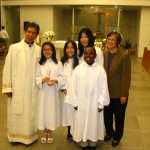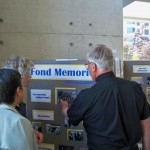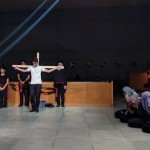We believe in Life
November is the month of the Holy Souls. During this month especially we pray for all those who died. The Hebrew Scripture tells us that it is a good and holy thing to pray for the death that they we loosed from their sins.
Death is a reality of life. As someone once said, ‘no one gets out of this world alive.’ Yet death is a no no subject for a lot of people. Death is like a four letter, we never say some died, we say they ‘passed’ or ‘passed on’ or they are ‘no longer with us.’
As Christians we endure death but we believe in life, endless life and so we do not grieve like people who have no hope, we believe that Jesus rose again and that it will be the same for those who die believing in him; God will bring them to himself.
Our first reading in today’s Mass tell of this heroic family, the Maccabees who all died painful deaths rather than deny their faith in the God of the universe who would raise them up to an everlasting renewal of life.
In the gospel the Sadducees, who did not believe in life after death used this silly example of the woman, married to the seven brothers and asked Jesus whose wife will she be when she dies. Probably with great patience, Jesus tried to set them straight. Firstly, the resurrection is not a prolongation of our presently earthly life. There will be a new heaven and a new earth and an entirely new mode of existence in which marriage will not be an issue.
We have no idea what life after death will be like. St.Paul tells us that ‘the eye has not seen, nor has the ear heard, nor has it entered into human mind the things God has prepared for those who love him.
We can look at death in another way. There are people who can be so upset that a loved one died and there wasn’t a priest present. One priest I knew had a great thing to say to such good people; ‘if you tell me how he lived I can tell you how he died.’ We can believe that there is no discontinuity between this life and the afterlife, there is just life and so the way we live now will be the way we will live always. Think about it.
If our lives are open to others and the needs of others, if we are willing to love as we have been loved, if we are willing to forgive as we have been forgiven then we can trust the truth that ‘as it was in the beginning, is now and will be forever – in this world and the next.
Every Sunday we rattle off the Nicene Creed, our ancient statement of faith that goes back to the early days of the church. The final words of our statement of faith are, ‘I look forward to the resurrection of the dead and the life of the world to come. We endure death but we believe in life, endless life.
 Founded by St. Paul of the Cross, every Passionist takes a special vow to spend his or her energies in promoting remembrance of the sufferings of Jesus, the memory of the Cross, and reflection of the meaning of the Cross for the world.
Founded by St. Paul of the Cross, every Passionist takes a special vow to spend his or her energies in promoting remembrance of the sufferings of Jesus, the memory of the Cross, and reflection of the meaning of the Cross for the world.




